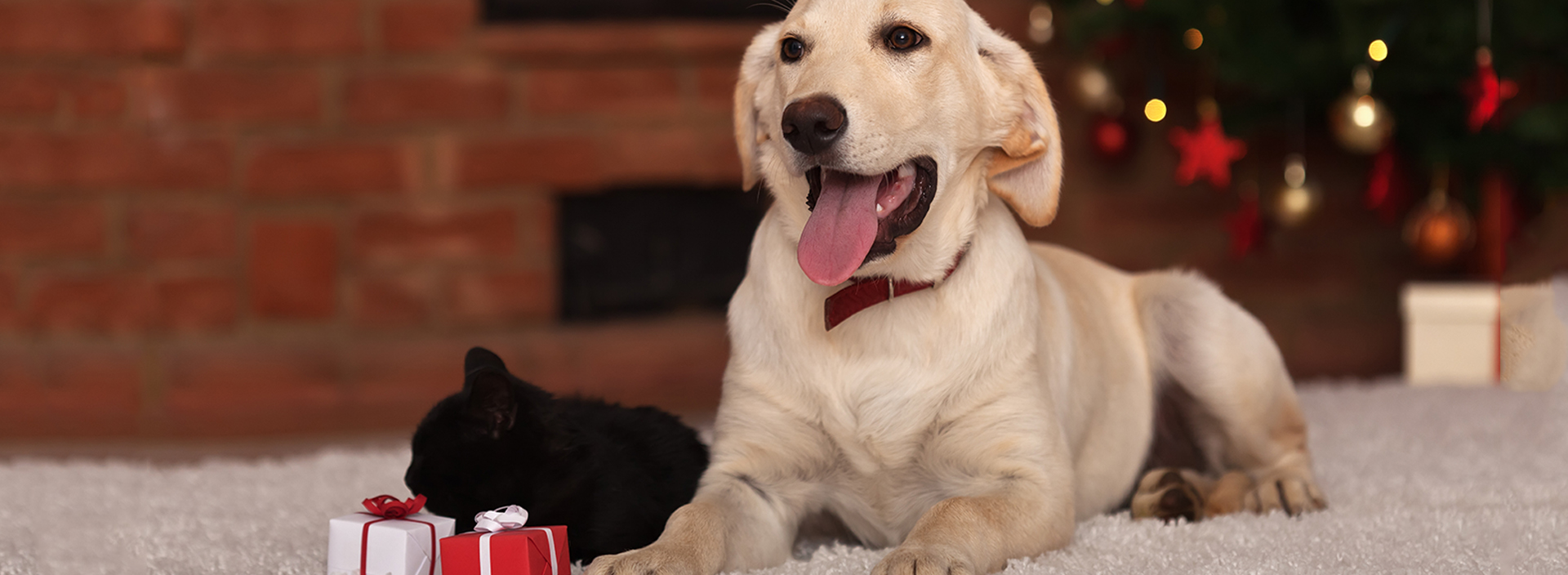SPA Veterinary Services
Christmas is a great time of year for your pets. Many love having the family at home and can sense that the people in their household are happy and relaxed. You may find that dogs and cats become more playful and interact more with members of the family!
However, every year, we see numerous patients who have become ill or injured as a result of the season. Here are a few warnings so your pet isn’t one of them!
1) Chocolate
It is now a relatively well known fact that chocolate is poisonous (depending on the theobromine content) to dogs but we are still seeing this type of poisoning all too often, especially at this time of year. The most common occurrence is in the dog that has found chocolate lying around the house, or smelt it wrapped up under the tree and has decided to help themselves. The easiest way to avoid this is to never leave your dog unattended when there is chocolate around, or keep the chocolate out of their reach. The smell is normally too much for them to resist! As with humans, the smell of chocolate is, to most, very enticing and with their sense of smell 50-100 times more powerful than ours, it’s not hard to see how this happens! As little as 1.25g of chocolate per kg of your dog’s body weight is enough to cause serious problems (depending on the type of chocolate consumed). Symptoms can include hyperactivity, salivation, fitting/seizures and in some cases, can lead to death. Symptoms are not normally seen until the chocolate has been digested. If you suspect your dog has eaten chocolate, please contact the surgery IMMEDIATELY. If you could have the packaging ready when you call, we can work out the severity of the situation. We may require you to bring the dog straight down to the surgery but will advise you on the best course of action when you call.
2) Raisins and Grapes
Unlike with chocolate, raisin and grape poisoning is not so well known, probably because it is not seen as often. Not many dogs would steal such items, as they are not so appealing. Unfortunately at this time of year, there are numerous cakes, mince pies etc in the home, which smell very tasty to canine noses! Unlike chocolate, there is no ‘toxic dose’ with each animal reacting differently- some may eat numerous without any side effects, whilst others need only one for it to be fatal, regardless of their size. It is therefore best to avoid letting your dog eat such items.
If you suspect your dog may have eaten grapes and/or raisins, please contact the surgery immediately for advice.
3) Antifreeze (Ethylene glycol).
This isn’t so much a Christmas hazard, as a winter one! Cats especially are at risk if they ingest even a small amount. As little as 1/4 of an ounce (1-2 teaspoons) can be lethal for a medium sized dog. It can be licked off the ground following spillages or leaks. Acute cases of antifreeze toxicity often present as if the animal was ‘drunk’; stumbling, vomiting and depression. Seizures, increased urination and increased thirst may also be seen. The kidneys are most severely affected, and even if the animal seems to improve initially with treatment, they may succumb shortly after to kidney failure. Success of treatment is dependent upon QUICK treatment. If antifreeze ingestion is known or even suspected, do not delay. Kidney damage will increase in severity by the hour. If you suspect that your animal has come into contact with antifreeze, contact us IMMEDIATELY, again, with the packaging to hand if possible.
4) Christmas trees and decor!
Although not poisonous, such items can still be hazardous to pets. Inquisitive cats may try to climb trees and fall or bring the trees down on top them with a risk of broken bones and fractures, glass baubles can shatter causing cuts, especially to feet, tinsel may be eaten by any pet and cause blockages to the digestive system and so on! The easiest way to protect your pet is to monitor them closely!
Should you be concerned about your pet, please don’t hesitate to contact us. Despite being closed on Christmas Day, Boxing Day and New Years Day, there will be members of staff on call at all times in case of an emergency, just call the usual number for details on how to contact the duty vet. For details of our opening times over the festive period, please contact your local branch or visit our website for details.

